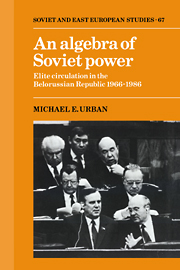Book contents
- Frontmatter
- Contents
- List of figures and tables
- Preface
- Acknowledgements
- 1 Method, model and historical background
- 2 Hierarchy, mobility and a stratified model
- 3 Centralization as a determinant of elite circulation
- 4 The regional structure of elite circulation
- 5 The structure of patronage affiliations
- 6 Does faction make a difference?
- 7 Political succession
- 8 Conclusions, implications and the question of levels
- Appendix A Stratification of positions in the Belorussian Republic, 1966–86
- Appendix B A roster of factional groups in the Belorussian Republic, 1966–86
- Notes
- Index
- Soviet and East European Studies
7 - Political succession
Published online by Cambridge University Press: 09 November 2009
- Frontmatter
- Contents
- List of figures and tables
- Preface
- Acknowledgements
- 1 Method, model and historical background
- 2 Hierarchy, mobility and a stratified model
- 3 Centralization as a determinant of elite circulation
- 4 The regional structure of elite circulation
- 5 The structure of patronage affiliations
- 6 Does faction make a difference?
- 7 Political succession
- 8 Conclusions, implications and the question of levels
- Appendix A Stratification of positions in the Belorussian Republic, 1966–86
- Appendix B A roster of factional groups in the Belorussian Republic, 1966–86
- Notes
- Index
- Soviet and East European Studies
Summary
The political succession that transpired in Belorussia during the first half of the 1980s was a multi-phased process that developed in tandem with the Brezhnev succession. In the BSSR, leadership change was in some respects determined by the events that unfolded in Moscow while in others it anticipated them. Here, our intention is, first, to provide a narrative overview of this period of extraordinary flux in the personnel system by recounting the various factional alignments that formed, disintegrated and reformed over the course of the succession. Thereafter, our attention turns to the personnel changes that took place in the upper strata of the Belorussian hierarchy. We are concerned in this respect both to chronicle the rise and fall of contending groups according to their respective numerical representations within the Republic's elite at one stage or another in the process, and to look beneath the surface of these ratios in order to locate their basis in (shifting) factional coalitions. Lastly, we consider the outcome of the succession and offer some observations on apparent structural changes in the personnel system of the BSSR that seem to correlate with the direction of such changes in the USSR as a whole.
Succession in the BSSR in the context of Kremlin politics
For their participation in the coalition that deposed N. S. Khrushchev in 1964, Belorussia's Partisan faction profited handsomely. K. T. Mazurov, First Secretary of the KPB since 1956 and leader of the Partisans, was within months promoted to the post of First Deputy Chair of the Council of Ministers of the USSR and elevated to full membership on the Politburo.
- Type
- Chapter
- Information
- An Algebra of Soviet PowerElite Circulation in the Belorussian Republic 1966–86, pp. 116 - 135Publisher: Cambridge University PressPrint publication year: 1989



